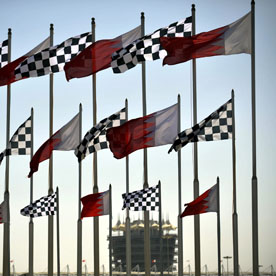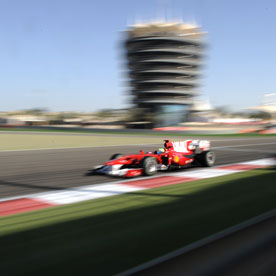Bahrain’s F1 Grand Prix given green light
The world motor racing body agrees to reinstate Bahrain in the Formula One circuit later in the year, despite a heavy crackdown on opposition protests during 11 weeks of martial law.
The FIA’s World Motor Sport Council has rescheduled the race, which was originally planned for March but postponed after protests began in February, to 30 October.
Zayed R Alzayani, Chairman of the Bahrain International Circuit, welcomed the news. In a statement, he said: “As a country we have faced a difficult time, but stability has returned, with businesses operating close to normal, the State of National Safety lifted and countries removing travel restrictions.”
Alzayani said the race would attract 100,000 visitors, support 3,000 jobs and deliver a $500 million economic boost.
It comes after the Gulf state ended a three-month period of emergency rule two weeks early on Wednesday, prompting activists to claim that emergency rule was ended early to increase the chances of hosting the Formula One race.

The Sunni Arab monarchy invited 1500 troops from Saudi Arabia and the United Arab Emirates to help quell the protest movement by activists from the majority Shi’ite population.
Foreign troops have left the main areas of the capital Manama but Bahraini security forces have continued to suppress protests.
As a country we have faced a difficult time, but stability has returned, Zayed R Alzayani, Chairman BIC
Civil rights activists – among them the US based Human Rights Watch – have called for the race to be cancelled altogether, but the Bahraini opposition party Wefaq supports the move to reinstate the race.
Jasim Husain, a senior figure in the Shi’ite group, said: “We at Wefaq support hosting the event. It will force all the stakeholders to come together to find solutions ahead of the event. It would bring indirect pressure on all parties; people could be released from jail in advance.”
Read more: Middle East uprisings special report
But a petition on the advocacy website Avaaz has gathered more than 300,000 international signatures, calling on Red Bull and other Formula One teams not to take part.
The petition reads: “Sports boycotts have piled pressure on other regimes such as apartheid South Africa – we can do it again.”

Suppressed protest
Police fired tear gas at rubber bullets on around 500 protesters who had gathered after Friday prayers near the city’s Pearl Roundabout. It’s not known how many people were injured.
Witnesses said that people had gathered to mourn Zainab Altajer who died on Thursday. Opposition activists said she died as a result of tear gas exposure, but the government said she died of of natural causes.
The protesters marched through to the nearby village of Sanabis, where people were reported to have been shouting “Down with (King) Hamad” and “Gulf forces out.”
Military trials
Meanwhile military trials of 21 mostly Shi’ite dissidents continue. According to the state news agency, a court sentenced six men on Thursday to jail terms ranging from one to five years in prison for rioting and gathering illegally in public with intent to cause disturbance.
This week, the king offered a new dialogue on reform with all sides as of July, without spelling out its parameters. Wefaq and other opposition groups welcomed the offer.
But Sheikh Issa Qassim, the most revered Shi’ite cleric in Bahrain, told worshippers at Friday prayers the opposition would need a popular mandate to enter any talks and suggested the king’s offer was not serious.
“Any political society, party or person will need a clear mandate from the street before entering any negotiations,” he said.
“Domestic security in any country is clear – it comes from a serious initiative for reform … The security approach is no longer able to keep people quiet,” Qassim added.
At least 30 people have been killed since protests began.